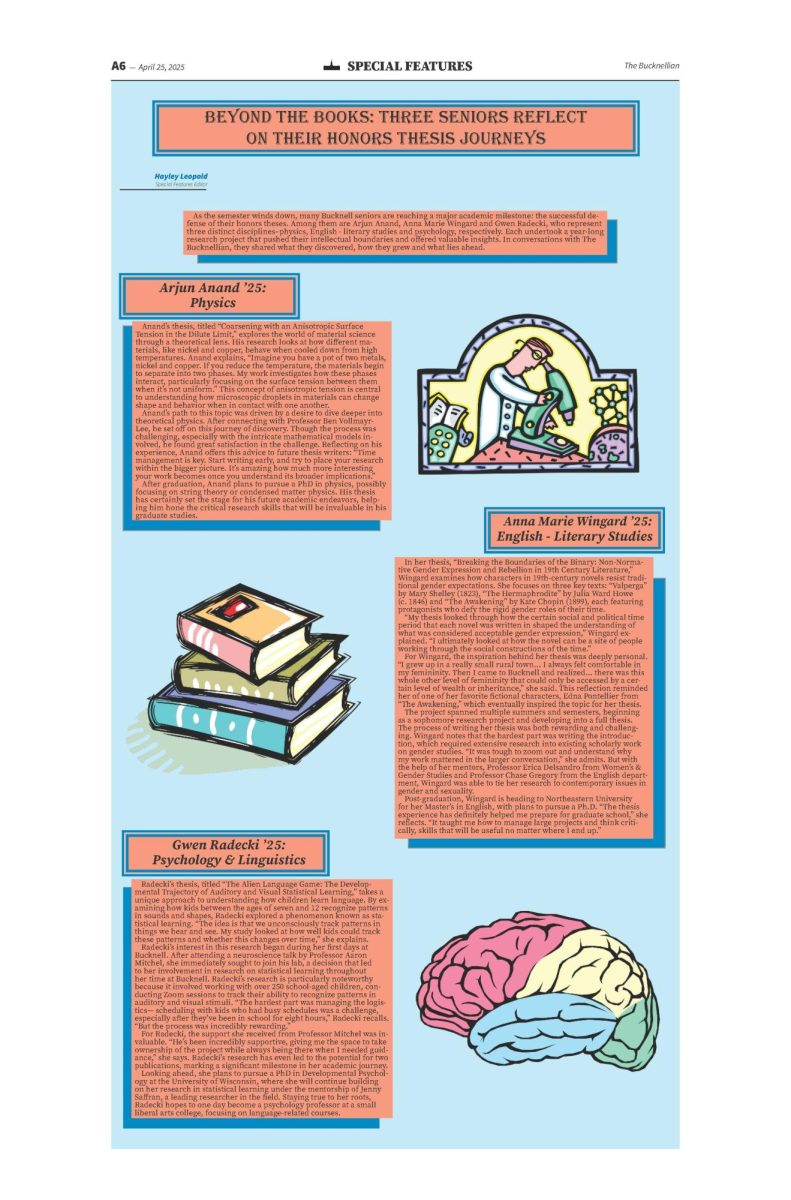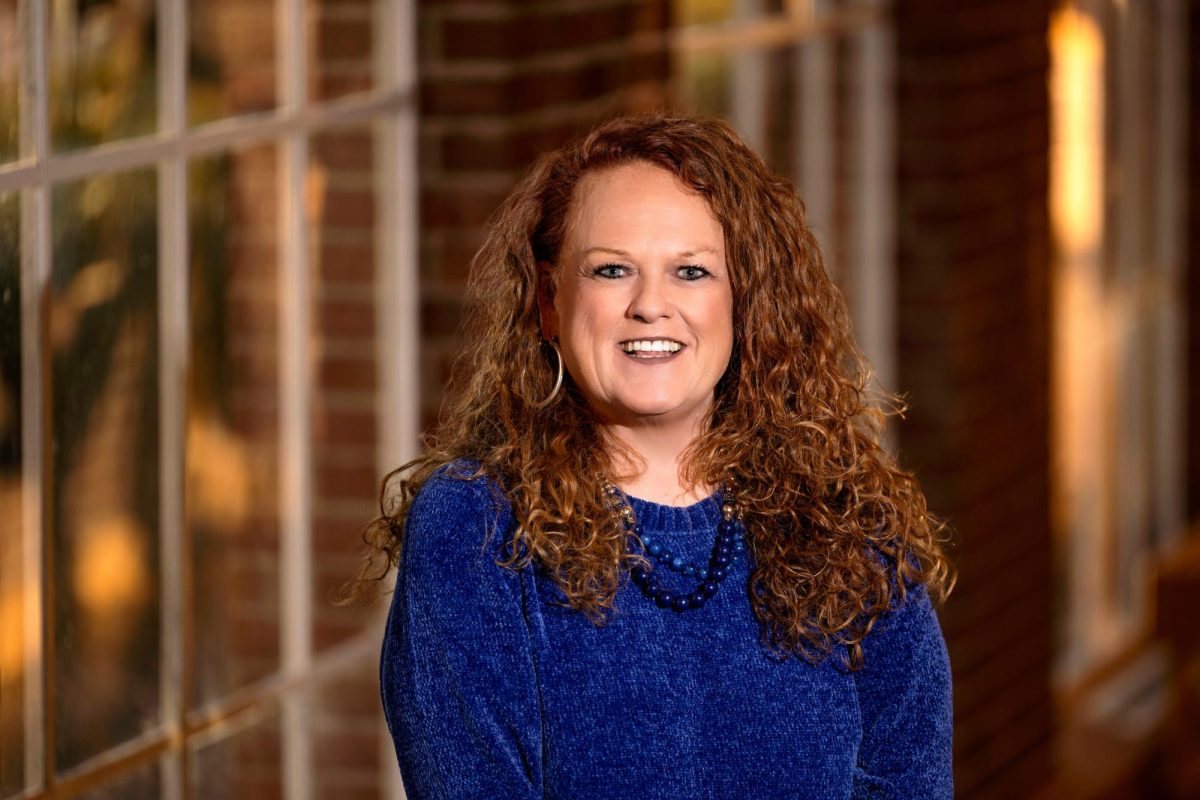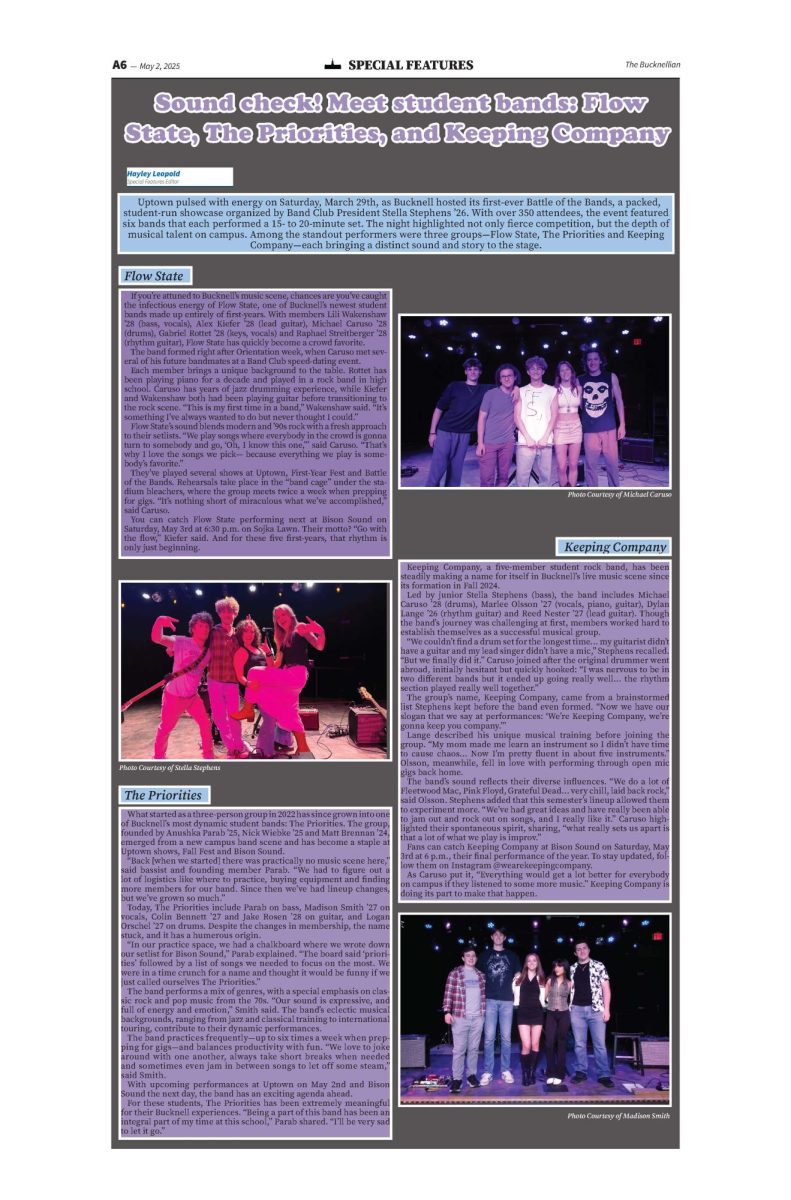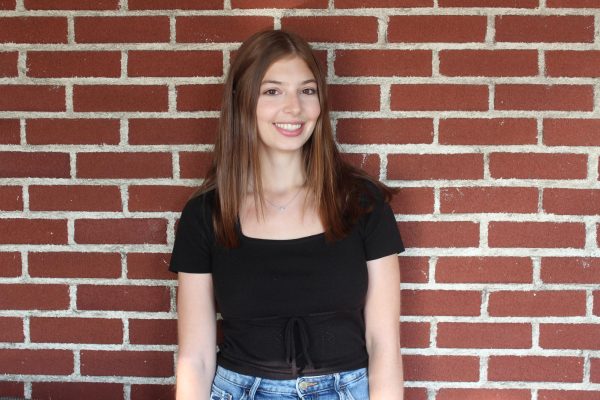As the semester winds down, many Bucknell seniors are reaching a major academic milestone: the successful defense of their honors theses. Among them are Arjun Anand, Anna Marie Wingard and Gwen Radecki, who represent three distinct disciplines–physics, English – literary studies and psychology, respectively. Each undertook a year-long research project that pushed their intellectual boundaries and offered valuable insights. In conversations with The Bucknellian, they shared what they discovered, how they grew and what lies ahead.
Anand’s thesis, titled “Coarsening with an Anisotropic Surface Tension in the Dilute Limit,” explores the world of material science through a theoretical lens. His research looks at how different materials, like nickel and copper, behave when cooled down from high temperatures. Anand explains, “Imagine you have a pot of two metals, nickel and copper. If you reduce the temperature, the materials begin to separate into two phases. My work investigates how these phases interact, particularly focusing on the surface tension between them when it’s not uniform.” This concept of anisotropic tension is central to understanding how microscopic droplets in materials can change shape and behavior when in contact with one another.
Anand’s path to this topic was driven by a desire to dive deeper into theoretical physics. After connecting with Professor Ben Vollmayr-Lee, he set off on this journey of discovery. Though the process was challenging, especially with the intricate mathematical models involved, he found great satisfaction in the challenge. Reflecting on his experience, Anand offers this advice to future thesis writers: “Time management is key. Start writing early, and try to place your research within the bigger picture. It’s amazing how much more interesting your work becomes once you understand its broader implications.”
After graduation, Anand plans to pursue a PhD in physics, possibly focusing on string theory or condensed matter physics. His thesis has certainly set the stage for his future academic endeavors, helping him hone the critical research skills that will be invaluable in his graduate studies.
In her thesis, “Breaking the Boundaries of the Binary: Non-Normative Gender Expression and Rebellion in 19th Century Literature,” Wingard examines how characters in 19th-century novels resist traditional gender expectations. She focuses on three key texts: “Valperga” by Mary Shelley (1823), “The Hermaphrodite” by Julia Ward Howe (c. 1846) and “The Awakening” by Kate Chopin (1899), each featuring protagonists who defy the rigid gender roles of their time.
“My thesis looked through how the certain social and political time period that each novel was written in shaped the understanding of what was considered acceptable gender expression,” Wingard explained. “I ultimately looked at how the novel can be a site of people working through the social constructions of the time.”
For Wingard, the inspiration behind her thesis was deeply personal. “I grew up in a really small rural town… I always felt comfortable in my femininity. Then I came to Bucknell and realized… there was this whole other level of femininity that could only be accessed by a certain level of wealth or inheritance,” she said. This reflection reminded her of one of her favorite fictional characters, Edna Pontellier from “The Awakening,” which eventually inspired the topic for her thesis.
The project spanned multiple summers and semesters, beginning as a sophomore research project and developing into a full thesis. The process of writing her thesis was both rewarding and challenging. Wingard notes that the hardest part was writing the introduction, which required extensive research into existing scholarly work on gender studies. “It was tough to zoom out and understand why my work mattered in the larger conversation,” she admits. But with the help of her mentors, Professor Erica Delsandro from Women’s & Gender Studies and Professor Chase Gregory from the English department, Wingard was able to tie her research to contemporary issues in gender and sexuality.
Post-graduation, Wingard is heading to Northeastern University for her Master’s in English, with plans to pursue a Ph.D. “The thesis experience has definitely helped me prepare for graduate school,” she reflects. “It taught me how to manage large projects and think critically, skills that will be useful no matter where I end up.”
Radecki’s thesis, titled “The Alien Language Game: The Developmental Trajectory of Auditory and Visual Statistical Learning,” takes a unique approach to understanding how children learn language. By examining how kids between the ages of seven and 12 recognize patterns in sounds and shapes, Radecki explored a phenomenon known as statistical learning. “The idea is that we unconsciously track patterns in things we hear and see. My study looked at how well kids could track these patterns and whether this changes over time,” she explains.
Radecki’s interest in this research began during her first days at Bucknell. After attending a neuroscience talk by Professor Aaron Mitchel, she immediately sought to join his lab, a decision that led to her involvement in research on statistical learning throughout her time at Bucknell. Radecki’s research is particularly noteworthy because it involved working with over 250 school-aged children, conducting Skype sessions to track their ability to recognize patterns in auditory and visual stimuli. “The hardest part was managing the logistics — scheduling with kids who had busy schedules was a challenge, especially after they’ve been in school for eight hours,” Radecki recalls. “But the process was incredibly rewarding.”
For Radecki, the support she received from Professor Mitchel was invaluable. “He’s been incredibly supportive, giving me the space to take ownership of the project while always being there when I needed guidance,” she says. Radecki’s research has even led to the potential for two publications, marking a significant milestone in her academic journey.
Looking ahead, she plans to pursue a PhD in Developmental Psychology at the University of Wisconsin, where she will continue building on her research in statistical learning under the mentorship of Dr. Jenny Saffran, a leading researcher in the field. Staying true to her roots, Radecki hopes to one day become a psychology professor at a small liberal arts college, focusing on language-related courses.
























